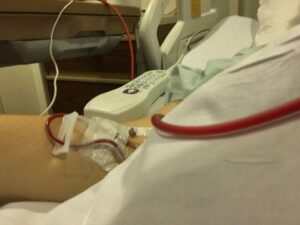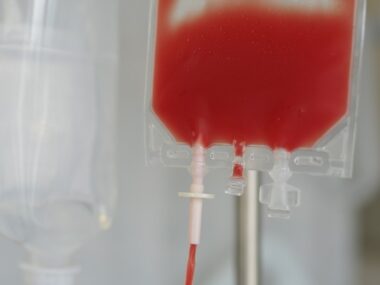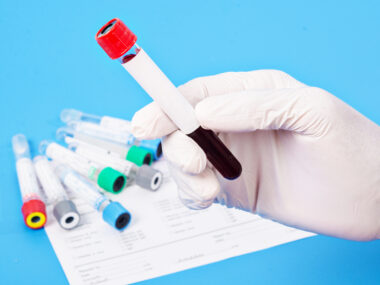Blood donors are heroes, especially in the eyes of CAD patients like me
How someone's small sacrifice made a huge difference in my life
Written by |

“Have you given blood yet? We could go over after band practice.”
It was 1972, my freshman year of college, and the annual “Beat ‘Bama” blood drive was being held in the student activities building. Having grown up in Auburn, Alabama, where Auburn University is located, I had heard of the drive but had never considered donating before.
I was reluctant because I quailed at the idea of having a needle poked into my arm. I expected it to hurt! My friend poured forth her good arguments for donating blood. “The wounded boys in Vietnam need blood donations. Every little bit helps.” That was a good point. “Besides,” she continued, “the ‘Bama students are gaining on us.” That was a salient argument. I always wanted to beat our rival, the University of Alabama, no matter the activity.
Then, she clinched it: “Someone gave all of his blood for you. You can easily spare a pint.”
That someone she was talking about was Jesus. I believe that by his blood we are healed. With that statement, I went over to the blood drive and rolled up my sleeve.
Little did I know that donating blood would become a way of life for me. Every chance I got, I’d endure the pain and donate a pint of my precious fluid. In the back recesses of my brain, I always knew that someone I loved may need blood one day, and I’d want it to be available.
Then 2018 happened
After years of becoming increasingly tired and experiencing breathing problems, I was finally diagnosed with cold agglutinin disease (CAD) in 2018.
CAD is a type of autoimmune hemolytic anemia in which, at certain temperatures, a person’s red blood cells clump together (agglutinate) and are destroyed. The resulting symptoms include shortness of breath, tiredness, acrocyanosis, and jaundice. I had all of these. A medley of symptoms came together in May of that year, and I had to leave the remote location where my husband and I work.
I traveled to my home in Auburn and immediately saw my primary physician. He sent me to the hospital and referred me to a hematologist oncologist. I was so weak I could barely walk, and my hemoglobin level was about half of what it should have been!
My memory of the occasion is jumbled, but I do recall that I was prescribed two units of whole blood. I felt better almost immediately. My hemoglobin didn’t rise all the way to a normal range, but I was assured that it probably would once I began treating my CAD.
The donation process
At my first blood donation, I found that the process wasn’t difficult. I was asked a series of questions concerning my health and general well-being. Certain medical conditions such as pregnancy, an ongoing illness, or cancer can prevent someone from donating, but I passed the tests that day.
Starting in about 1995, I was disqualified from donating in the U.S. because I’d had bouts of malaria. However, in Indonesia, where I live, prior cases of malaria were not disqualifying. Because malaria is endemic there, it is very difficult to find donors who have never experienced a single bout. I’ve donated a few times in Indonesia.
The next step in the process was to check my hematocrit levels, or the percentage of red blood cells in my blood. Anemia would have eliminated me. Blood donation does slightly deplete a person’s blood levels and may therefore cause problems for people with the condition.
Finally, the preliminaries ended, and I was told to lie down on a table. A tourniquet was applied to my arm, and a needle was inserted. It wasn’t the most painful thing that had happened to me, and I survived. After the pint was collected, I was escorted to a refreshment area. After approximately 15 minutes, I was allowed to leave.
Blood donors are true heroes
I enjoyed the good feeling of knowing I had made a difference in someone’s life. In 2018, someone certainly made a difference in mine.
I don’t use the term “hero” lightly. I apply it only to those individuals who make personal sacrifices on behalf of others. Donating blood is not a very difficult sacrifice to make. It takes a few minutes and there is minimal, soon-forgotten pain. But for those like me who need blood, donors are heroes.
During January, National Blood Donor Month, I salute you.
Note: Cold Agglutinin Disease News is strictly a news and information website about the disease. It does not provide medical advice, diagnosis, or treatment. This content is not intended to be a substitute for professional medical advice, diagnosis, or treatment. Always seek the advice of your physician or other qualified health provider with any questions you may have regarding a medical condition. Never disregard professional medical advice or delay in seeking it because of something you have read on this website. The opinions expressed in this column are not those of Cold Agglutinin Disease News or its parent company, Bionews, and are intended to spark discussion about issues pertaining to cold agglutinin disease.








Leave a comment
Fill in the required fields to post. Your email address will not be published.